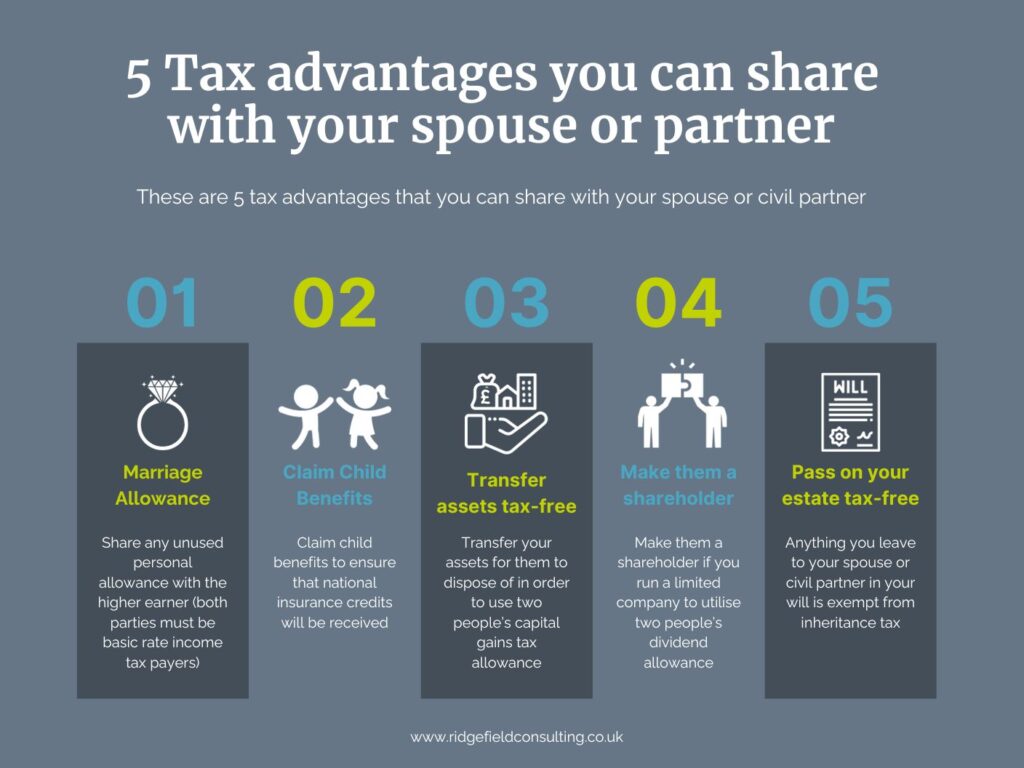5 Tax advantages you can share with a spouse or partner

5 Tax advantages you can share with a spouse or partner
Quick Links
Whilst there are many reasons why people choose to get married or have a civil union, it is undeniable that being able to share financial burdens with another person makes sense and is often an important consideration. From sharing tax allowances to shielding each other from tax liabilities, married couples and civil partners can benefit to make their finances go further when taking advantage of these 5 tax strategies:
1. Utilise marriage allowance to share unused personal allowance
Marriage allowance will benefit those married couples or civil partners where one person is not fully using their personal allowance. It allows the lower earner (who must be earning under £12,570) to transfer a maximum of £1,260 to the higher earner which therefore increases their annual tax-free income allowance to £13,830. To be eligible to claim marriage allowance, both parties must not be earning over the basic rate income bracket. Taking advantage of marriage allowance as a tax strategy means the combined household income will increase by £252 per year.
2. Claim child benefits if appropriate to help fund childcare costs
Claiming child benefits is often seen as confusing and not always considered worthwhile due to the complex rules. It may not benefit all couples or partners, especially if you do not live as one household because child benefits are only paid to one parent even if you both have separate financial responsibilities for your child. However, child benefits can amount to over £17,000 up until your child turns 16 or more if they remain in approved education or training. If you claim child benefits you will receive £24 per week for your first child and £15.90 for every other child you have. If you or your partner earn over £50,000 you will need to start paying part of it back up until one of you earns £60,000 or more where you will need to repay all of it. Nevertheless, there are other advantages to claiming child benefits that can still make it beneficial to you as a couple such as crediting the parent claiming with national insurance credits.
3. Transfer assets to one another to use both parties’ capital gains tax allowance
Usually when you transfer a valuable asset to someone, you will be liable for capital gains tax if the asset has increased in value since you first acquired it. The exception to this is if you transfer any of your assets over to your spouse or civil partner. Whilst the annual exemption allowance for capital gains tax was once much more generous at £12,300 per year, this has now been reduced to only £6,000 from April 2023 and is due to further reduce in April 2024 to £3,000. Although it is a small saving, it means now more than ever, it’s best to maximise opportunities where each person’s exemption allowance can be used. For example, if you own shares, you may want to transfer some to your spouse or partner to dispose of so that together you make a gain of £12,000 (so long as you do so within the 2023/24 tax year) without having to pay capital gains tax.
4. Make your spouse or partner a shareholder to increase income at a lower dividend tax rate
If either of you are directors in your own limited company, then one tax advantage that you can share with your spouse or partner is to make them a shareholder in the company. Doing this is beneficial as it means you can utilise two people’s tax-free dividend allowance which is separate to the personal allowance. What’s more, dividends are taxed at a lower rate than income tax. Making your spouse or partner a shareholder can therefore enable you to extract funds from your business and boost their income at a lower tax rate. However, do not forget that you can only issue dividends where your company is in profit. It is therefore not advisable that you rely solely on dividends as a source of income.
5. Passing on your estate to your spouse or partner is exempt from inheritance tax
Finally, the fifth tax advantage you can share with your spouse or partner is to pass your estate onto them 100% inheritance tax-free. Inheritance tax is charged at a significant 40% for estates over £325,000. With rising property prices and increasing national average wages, it means more and more people are going over this threshold and being subject to inheritance tax. When it comes to passing your estate onto your spouse or partner, any unused inheritance tax allowance is transferred over to them. So, for example, if you leave your entire estate to your spouse or partner, you will also transfer your £325,000 inheritance tax allowance over to them. They can then leave a total of £650,000 inheritance tax-free to loved ones. If they choose to leave their main residence to your children or grandchildren, your combined inheritance tax allowance further increases to £1 million as you will both be entitled to £125,000 each as part of the residence nil rate band. Inheritance tax planning is an important decision to be discussed with your spouse or partner and you may want to find out more about ways to minimise and how to calculate inheritance tax.
If you enjoyed this article on 5 tax advantages you can share with your spouse or partner, why not sign up to our monthly email newsletter for more tax advice straight to your inbox?
